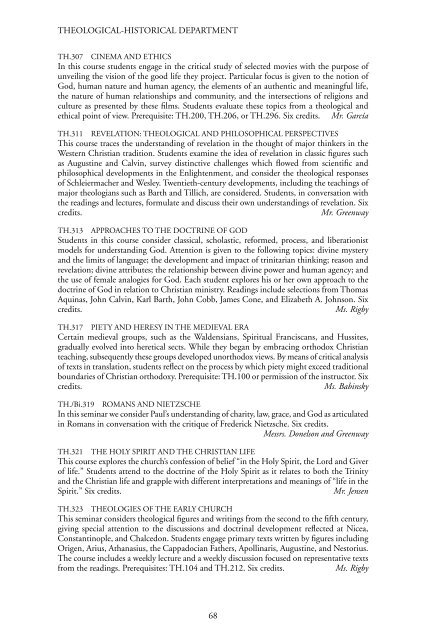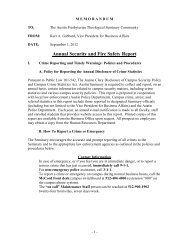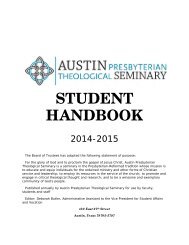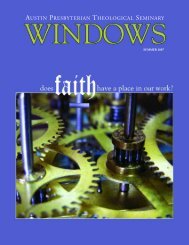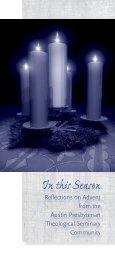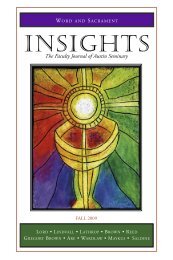Catalogue 2008 Book - Austin Presbyterian Theological Seminary
Catalogue 2008 Book - Austin Presbyterian Theological Seminary
Catalogue 2008 Book - Austin Presbyterian Theological Seminary
You also want an ePaper? Increase the reach of your titles
YUMPU automatically turns print PDFs into web optimized ePapers that Google loves.
THEOLOGICAL-HISTORICAL DEPARTMENT<br />
TH.307 CINEMA AND ETHICS<br />
In this course students engage in the critical study of selected movies with the purpose of<br />
unveiling the vision of the good life they project. Particular focus is given to the notion of<br />
God, human nature and human agency, the elements of an authentic and meaningful life,<br />
the nature of human relationships and community, and the intersections of religions and<br />
culture as presented by these fi lms. Students evaluate these topics from a theological and<br />
ethical point of view. Prerequisite: TH.200, TH.206, or TH.296. Six credits. Mr. García<br />
TH.311 REVELATION: THEOLOGICAL AND PHILOSOPHICAL PERSPECTIVES<br />
This course traces the understanding of revelation in the thought of major thinkers in the<br />
Western Christian tradition. Students examine the idea of revelation in classic fi gures such<br />
as Augustine and Calvin, survey distinctive challenges which fl owed from scientifi c and<br />
philosophical developments in the Enlightenment, and consider the theological responses<br />
of Schleiermacher and Wesley. Twentieth-century developments, including the teachings of<br />
major theologians such as Barth and Tillich, are considered. Students, in conversation with<br />
the readings and lectures, formulate and discuss their own understandings of revelation. Six<br />
credits. Mr. Greenway<br />
TH.313 APPROACHES TO THE DOCTRINE OF GOD<br />
Students in this course consider classical, scholastic, reformed, process, and liberationist<br />
models for understanding God. Attention is given to the following topics: divine mystery<br />
and the limits of language; the development and impact of trinitarian thinking; reason and<br />
revelation; divine attributes; the relationship between divine power and human agency; and<br />
the use of female analogies for God. Each student explores his or her own approach to the<br />
doctrine of God in relation to Christian ministry. Readings include selections from Thomas<br />
Aquinas, John Calvin, Karl Barth, John Cobb, James Cone, and Elizabeth A. Johnson. Six<br />
credits. Ms. Rigby<br />
TH.317 PIETY AND HERESY IN THE MEDIEVAL ERA<br />
Certain medieval groups, such as the Waldensians, Spiritual Franciscans, and Hussites,<br />
gradually evolved into heretical sects. While they began by embracing orthodox Christian<br />
teaching, subsequently these groups developed unorthodox views. By means of critical analysis<br />
of texts in translation, students refl ect on the process by which piety might exceed traditional<br />
boundaries of Christian orthodoxy. Prerequisite: TH.100 or permission of the instructor. Six<br />
credits. Ms. Babinsky<br />
TH./Bi.319 ROMANS AND NIETZSCHE<br />
In this seminar we consider Paul’s understanding of charity, law, grace, and God as articulated<br />
in Romans in conversation with the critique of Frederick Nietzsche. Six credits.<br />
Messrs. Donelson and Greenway<br />
TH.321 THE HOLY SPIRIT AND THE CHRISTIAN LIFE<br />
This course explores the church’s confession of belief “in the Holy Spirit, the Lord and Giver<br />
of life.” Students attend to the doctrine of the Holy Spirit as it relates to both the Trinity<br />
and the Christian life and grapple with different interpretations and meanings of “life in the<br />
Spirit.” Six credits. Mr. Jensen<br />
TH.323 THEOLOGIES OF THE EARLY CHURCH<br />
This seminar considers theological fi gures and writings from the second to the fi fth century,<br />
giving special attention to the discussions and doctrinal development refl ected at Nicea,<br />
Constantinople, and Chalcedon. Students engage primary texts written by fi gures including<br />
Origen, Arius, Athanasius, the Cappadocian Fathers, Apollinaris, Augustine, and Nestorius.<br />
The course includes a weekly lecture and a weekly discussion focused on representative texts<br />
from the readings. Prerequisites: TH.104 and TH.212. Six credits. Ms. Rigby<br />
68


